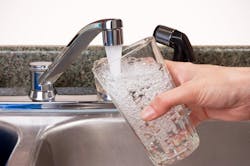Water reuse, also known as water reclamation or water recycling, is the act of reclaiming water from various sources and reusing it for a range of different purposes.
This guide will discuss the types of water that can be reused, the different ways to reuse water, the advantages of reusing water and more.
What Is Water Reuse?
When somebody reclaims water and reuses it for another purpose, it is known as water reuse.
Water reuse is common amongst people with low water security, such as well owners during the summer season, and people who want to implement more sustainable practices and save money on their water bill. Water is also reused in large-scale applications, to reduce pollution, prevent waste and save money.
There are two types of water reuse: planned and unplanned.
Some people may design a system with the goal of recycling and reusing a water supply. For instance, you may choose to reuse your water as much as safely possible before reintroducing it to the environment. This is known as planned water reuse. Some examples of planned water reuse are in irrigation and industrial setups.
Other people receive a source of water from water that has been previously used. This is known as unplanned water reuse. For instance, your drinking water may be sourced from a river that treated wastewater is discharged into.
Is Water Reuse Regulated?
There currently are not any nationwide restrictions or regulations for water reuse in the USA, and the EPA allows water supplies to be reused in any way.
Different states might have their own individual programs relating to water reuse in order to protect the quality of their natural water sources and their drinking water supplies.
Types of Water to Reuse
Any type of water can be reused, including:
- Rainwater
- Industry processing water
- Agricultural runoff
- Municipal wastewater
- Water from resource extraction
For small-scale, at-home applications, rainwater is one of the water sources that is easiest to reuse. Rainwater is not entirely pure - it contains contaminants like nitrates and salts, and recent research has uncovered that PFAS chemicals make rainwater unsafe to drink - but it is generally cleaner than municipal wastewater and runoff, so it is easier to treat.
What to Consider When Reusing Water
When reusing water, consider whether the water source is safe to use for the intended purpose, or whether the water will need to be treated to improve its quality and make it fit for purpose.
For instance, if you plan to reuse water for drinking, depending on its original use, it may have accumulated dangerous chemicals, metals, or microorganisms that shouldn’t be ingested by humans. In this case, the water will need to be filtered or disinfected to make it safe for drinking.
Generally, water that will eventually end up being consumed by humans (such as drinking water and water used for crop irrigation or food storage) requires more treatment than water that will be used for non-human applications.
Ways to Reuse Water
Some of the best ways to reuse water are:
- For drinking water (both for large-scale municipal water supplies and small-scale at-home water recycling)
- For irrigation (again, both in the agricultural sector and for small-scale landscaping and gardening applications)
- To process water in factories, refineries and power plants
- For indoor uses (such as to flush toilets)
- To clean roads or for use in construction sites, such as concrete mixing
- To fill pools or supply artificial lakes
How to Reuse Water at Home
Some clever ways to reclaim and reuse water at home are:
- Place a bucket in your shower to catch shower water
- Catch runoff from your roof with a rain barrel
- Save the water used to boil pasta or potatoes
- Save leftover ice
- Install a gray water collection system
If you do not want to treat your used water, the safest methods of reusing water are for watering your lawn and washing your car.
Advantages of Reusing Water
Some of the biggest advantages of reusing water are:
Sustainable
Reusing water is a sustainable practice. When water is reused, it means that less water is taken from external water sources, thus sustaining freshwater supplies, and discharges are reduced. This benefits the environment and the economy.
Penny-saving
Multiple parties can benefit from the penny-saving perks of reusing water. Households that reuse water have a smaller water bill, and water suppliers treat smaller volumes of water, minimizing overall costs.
Eases Pressure on Water Suppliers
When households make an effort to reuse their water, water suppliers are less pressured to treat and supply large volumes of water.
Reduces Pollution
When water is reused at the same location, it prevents the discharge of pollutants into other waterways. This reduces overall water pollution, promoting healthy environments for wildlife.
Takeaway
There are numerous ways to reuse water, and a variety of water sources that can be reused.
For small-scale applications, reusing rainwater is the simplest and most cost-effective practice. Reusing water is beneficial to the environment and the economy, reducing pollution and easing the pressure on water supplies. Check with your state to see if there are local regulations for reusing water in your area.
